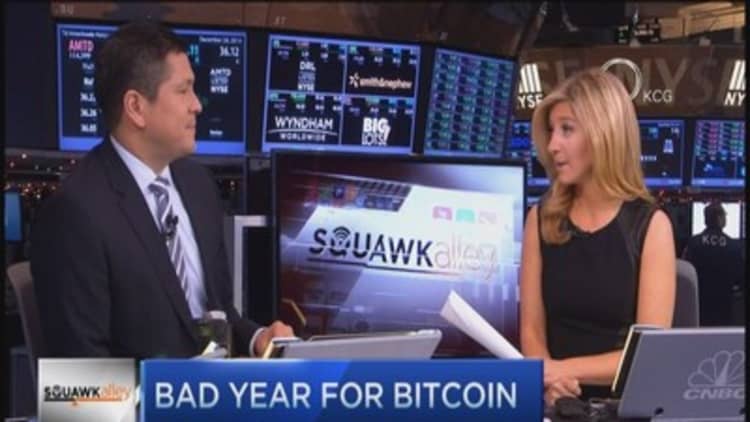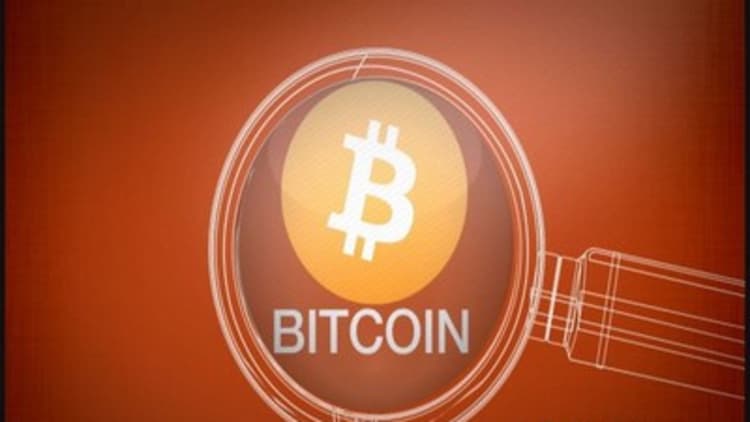
Technologists, financiers and ideologues predicted that 2014 would be bitcoin's coming-out party, but the digital currency slipped more than 70 percent from the previous year's high. Still, some are claiming victory and predicting even more success for the future.
Bitcoin—a digital currency started in 2009—has consistently captured headlines since its meteoric rise from a few dollars to more than $1,150 in 2013, but experts say that the focus on its slide to the $300 range misses the point. Instead, they point to growing merchant adoption and consumer awareness as the year's high points.
As for the future, bitcoin-related business owners said they are looking forward to stabilization and legitimacy from impending government regulation.
"Regardless of the price, it was a huge year for bitcoin," said Sonny Singh, chief commercial officer at BitPay. "A year ago people didn't know if bitcoin was a fad, but today it's for sure that it's going to stay for a long time."
Value as currency
One of the major criticism's of bitcoin is that it can never operate as a currency because its price is too volatile, but Singh said the latter part of 2014 saw the beginning of digital asset's maturation into stability.
This stabilization, he said, featured bitcoin trading at $290 in October, breaking above $425 in November and then settling around $310 at the end of December. Singh pointed to the recent announcement that Microsoft would begin accepting bitcoins as the prime example of a less volatile trading ecosystem.
"If we had made that Microsoft announcement at the beginning of the year, [bitcoin] would have gone up 50 percent," Singh said. "Microsoft is the biggest thing to happen to bitcoin, and it barely touched the price."
Read More3 reasons Wall Street can't stay away from bitcoin
Volatility aside, bitcoin saw a major price slide in 2014. Just why that has occurred, however, has proven a matter of debate.
One factor potentially weighing on the price was the February filing for bankruptcy protection by Tokyo-based bitcoin exchange Mt.Gox, which saw nearly all of the exchange's 850,000 bitcoins disappear, according to Brendan O'Connor, managing director for trading at SecondMarket.
Another potential reason for 2014's slide in price, some skeptics said, could be that bitcoin simply does not possess an adequate consumer use-case.
"The reality is that btcoin is possibly not safer, possibly not cheaper, possibly not faster than other means of distributing money from point A to point B," said Mark Williams, risk management professor at Boston University, adding that "bitcoin is seven times riskier than gold, eight times riskier than the S&P and 15 times riskier than the U.S. dollar."
Read MoreCNBC Explains: How to mine bitcoins on your own
Williams had predicted in December 2013 that the bitcoin bubble could burst and drop in value by more than 90 percent. For 2015, he took a more positive outlook, telling CNBC that the cryptocurrency could experience a boost if it successfully attains regulatory legitimacy.
Consumer adoption
Beyond bitcoin's fortunes as a traded asset, the cryptocurrency saw a string of positive announcements for consumer adoption.
In addition to Microsoft, many big-name companies—including Dish, Expedia and Overstock.com—began accepting bitcoin for sales during 2014. By giving consumers more ways to use bitcoins, enthusiasts said, the currency has begun to move away from its roots as a tool for illegal activities and speculation.
Those firms did not dip their toe into the bitcoin ecosystem without help: Companies such as Coinbase and BitPay act as payment processors that will instantly convert bitcoin transactions into local currency.
Read MoreBitcoin needs more consumer protection
"The merchant interest was a huge change that happened in 2014," said Coinbase CEO Brian Armstrong. " If you go back to Jan. 1 in 2014, there were zero large companies in the U.S. that accepted bitcoin."
The cryptocurrency is also entering the consumer sphere in other ways, as so-called bitcoin ATMs popped up around the globe. The concept is to introduce bitcoins to the average person, whose interest might be piqued by a way to physically interact with the digital currency.
ZenBox, a Santa Monica, California-based company that provides such kiosks, has expanded its business to 18 locations. Using the kiosk, consumers can instantly buy and sell the currency with cash in hand.

"For the general public or for the ecosystem in general, [bitcoin] is on the verge of explosion," said Cailen Sullivan, CEO of ZenBox. Sullivan said he's seen 50 to 200 users a month on a ZenBox machine, with average transactions of about one bitcoin.
But all of those consumer adoptions—from both ATMs and mainstream merchants—may not paint the whole picture of bitcoin's growth outside of tech circles.
Read MoreBitcoin's 'BearWhale' and the future of a cryptocurrency
While the number of companies accepting bitcoin has roughly tripled, the number of people using the digital currency to purchase goods and services has not grown at all, said Jeffrey Robinson, author of "BitCon: The Naked Truth about Bitcoin."
In fact, Robinson suggested the consumer use of bitcoin has been supported by early speculators cashing out.
"I think what you'll see a year from now is probably 100,000 businesses saying 'we'll take it' ... but the buying of goods and services begins to recede, and the price will slide down," Robinson said.
As for bitcoin's physical entry into the consumer world, Robinson suggested the ATMs "are all going broke because they can't afford the placement, and no one is using them."
Public perception and regulation
The key to bitcoin finding more users in 2015 might lie in government regulation, experts said. Increased consumer protection, they said, would boost adoption as it both legitimizes the technology and reassures those on the fence about buying into the cryptocurrency world.
"If the average Joe sees that the U.S. government has OK'd this technology and given guidelines for this technology to be built on, in their eyes that's legitimacy," Sullivan said.
Governments around the world are currently considering bitcoin regulation. Within the U.S. this charge has been led by the BitLicense currently under revision by Benjamin Lawsky, New York state superintendent of financial services. This license would certify businesses managing bitcoin transactions and require them to maintain certain records.
Read MoreBitcoin: Lawsky softens 'BitLicense' requirements
Lawsky's office said earlier this month that the license should be finalized by early 2015.
Regulation will not only boost consumer confidence in the technology, but it will also remove many of the barriers preventing more companies and investors from becoming involved in the space, SecondMarket's O'Connor said.
"We are very close to getting a regulatory framework in place, and that will be a huge boon for the industry," he said. "Once it's more black and white, you are going to see more institutional folks buying into the asset class, and the price will go up."
There are also challenges to overcome with the perception of bitcoin as a tool for crime. Earlier this month a district court sentenced high-profile bitcoin advocate, Charlie Shrem, to two years in prison for indirectly sending $1 million in bitcoin to the Silk Road—an online black market known for selling illegal drugs.
Read MoreIs Apple Pay a bitcoin killer?
A reputation shift, bitcoin experts said, could come from increased company adoption and financial investment.
"I think this year bitcoin put the early days behind itself," Armstrong said. "It's really hard to argue that bitcoin doesn't have many legitimate benefits to companies that are legal businesses when you have Dell and Expedia and all these companies now accepting it."
Many big-name investors have also added legitimacy to the cryptocurrency by putting "their money where their mouth is" and doubling down on bitcoin technology, Armstrong said.
Bitcoin 2.0
In fact, many alternative cryptocurrencies (altcoins) saw their fortunes rise and fall throughout 2014.
While many prognosticators focus on bitcoin—the globally dominant digital currency—some experts emphasize that being the first developer does not necessarily preclude someone else from creating a better alternative.
Additionally, some technologists and financiers are experimenting with using the record-keeping capabilities pioneered in bitcoin to create all manner of new applications.
Read MoreForget currency, bitcoin's tech is the revolution
But this development is not necessarily welcome news for those holding on to bitcoins: Depending on which (if any) of these measures succeed, bitcoin could either become inextricably tied to the future of all digital transactions, or it could be relegated to historical curiosity.



